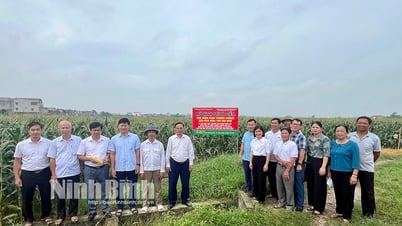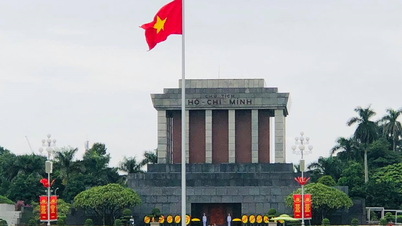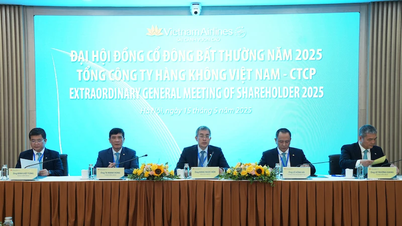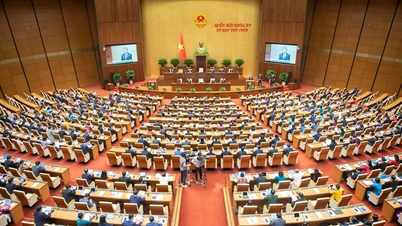
Lack of sanctions
E-commerce in Vietnam has grown strongly in recent years. The size of the e-commerce retail market currently ranks 3rd in Southeast Asia, reaching about 25 billion USD. Of the total size of 36 billion USD of Vietnam's digital economy , e-commerce accounts for 2/3. Notably, in terms of growth rate, Vietnam is currently ranked 5th in the world.
The e-commerce market is an attractive investment destination for many foreign investors, helping Vietnamese consumers become global consumers, with access to a wide variety of domestic and international products. Vietnamese small and medium-sized enterprises have taken advantage of modern platforms to develop distribution channels for their goods and products.
According to the "Online Retail Market Overview Report 2024 and Forecast 2025" recently released by Metric, the total sales of the 5 most popular e-commerce platforms in Vietnam today (Shopee, Lazada, TikTok Shop, Tiki and Sendo) in 2024 reached 318.9 trillion VND, an increase of 37.36% compared to 2023. At the same time, the total consumption output also reached 3,421 million products, a sharp increase of 50.76%. These figures show that the market's purchasing power remains high.
A survey result shows that on average, a Vietnamese consumer buys online up to 4 times/month. However, along with the strong development of e-commerce, fraudulent behaviors are also appearing, increasingly sophisticated and unpredictable in both scale and area of operation.
Regarding this issue, Ms. Nguyen Quynh Anh - Vice Chairman of the National Competition Commission said that the rapid development of e-commerce activities also poses challenges to the management, supervision and protection of consumer rights. In particular, the biggest challenge today is that e-commerce transactions are becoming increasingly complex. When consumers participate in many e-commerce transactions, they also expect a lot from state management agencies.
It is easy to see that state management agencies still face difficulties in managing and supervising business activities with cross-border e-commerce platforms; the problem of controlling counterfeit goods, fake goods, banned goods, goods that infringe intellectual property rights, poor quality goods... on e-commerce. For example, with livestream sales activities, the accuracy of the information provided is not yet controlled.
Many consumers have had to "swallow the bitter pill" when they accidentally bought goods on the online market that were not as expected, the goods were completely different from the advertising images that the online shops provided, in the end consumers still had to suffer because they did not know how to claim their rights...
To manage this field, recently, the Government issued Decree No. 52 dated May 16, 2013 on e-commerce and Decree No. 85 dated September 25, 2021 amending and supplementing a number of articles of Decree 52/2013.
However, according to Minister of Industry and Trade Nguyen Hong Dien, the rapid development of technology, along with the emergence of new business models, diverse in subjects, and complex in nature, has led to many challenges in state management of e-commerce. As a result, current policies and regulations have revealed problems that need to be overcome, such as: The legality of legal documents is still low and there is a lack of sanctions for violations; there are no regulations to regulate new e-commerce models, including platforms based on big data, artificial intelligence, and social network commerce; there is a lack of specific mechanisms for subjects participating in e-commerce, especially in determining rights and obligations. This makes it difficult to handle violations, creating an increased risk of commercial fraud and tax evasion.
Experts also suggested that a specialized legal framework should be established soon to promote e-commerce development, catch up with global trends, attract investment, and mobilize resources. The e-commerce law will protect the interests of related parties, especially protecting the rights of consumers more effectively.
Economist - Associate Professor Dr. Nguyen Thuong Lang emphasized that there needs to be a legal framework to facilitate the development of new and high technologies, opening up space for e-commerce. More importantly, there needs to be international connectivity in the law to help Vietnamese e-commerce platforms integrate into the global market. In addition, attention should be paid to issues of intellectual property protection, payment, tax management, etc.
Major policies on e-commerce
Ms. Le Hoang Oanh - Director of the Department of E-commerce and Digital Economy (Ministry of Industry and Trade) said that recently, the Ministry of Industry and Trade has urgently developed 5 sets of documents related to the dossier of Proposal to develop the Law on E-commerce, including: Law development dossier, impact assessment report, summary report on implementation of current laws, policy proposal report. These documents have been publicly posted on the Government's e-portal and the Ministry of Industry and Trade's e-portal since January 17, 2025 to widely collect opinions from organizations and individuals according to regulations.
Based on the assessment of practical implementation, identifying necessary contents that need to be supplemented and completed to plan e-commerce policies in the coming time, the Ministry of Industry and Trade identifies 5 major policy groups, including: Supplementing and unifying concepts according to current legal regulations; Regulating forms of e-commerce activities, subjects participating in e-commerce activities, related rights and obligations with the goal of ensuring that no e-commerce activity models and subjects are left out; Ensuring transparency in authority, clarity in the limits of responsibility of state management agencies at all levels; Responsibilities of units providing e-commerce support services; Regulations on electronic contract certification services in commerce with the goal of fair treatment for types of reliable service providers; Quickly detecting and handling violations of laws related to e-contracts; Regulations on e-commerce development to institutionalize the viewpoints, policies and guidelines of the Party and Government on promoting e-commerce development; Promote green and sustainable e-commerce development, contribute to effective economic development, create value for the community, contribute to building a fair society and minimize negative impacts on the environment.
Regarding this issue, Mr. Nguyen Binh Minh (Executive Board of Vietnam E-commerce Association) said that the provisions in the E-commerce Law need to be comprehensive and consistent with the free trade agreements that Vietnam has signed; providing precise concepts about new technologies that will affect e-commerce transactions in the future. When building the E-commerce Law, there should be clear regulations on the roles and responsibilities of the participating parties to clearly define the legal responsibilities and rights of each party. In addition, the identification and authentication of goods, services, and e-commerce transactions are very necessary, especially in the context of international economic integration and trade wars between countries. This helps protect the rights of the participating parties and increases the legality of transactions when Vietnam participates in global e-commerce.
Sharing about this issue, Mr. Tran Hoang Ngan - National Assembly Delegate of Ho Chi Minh City once emphasized that the lack of adequate legal regulations on e-commerce management can cause great damage to the domestic socio-economy. "Therefore, it is necessary to soon complete regulations on state management so that e-commerce activities can be put into order, ensuring a fair competitive environment among production and business units. At the same time, prevent tax losses, protect consumers from buying goods of clear quality and origin" - Mr. Tran Hoang Ngan expressed his opinion.

Mr. Bui Trung Kien.
“E-commerce in Vietnam is growing very rapidly. That context requires Vietnam to have a strong and transparent legal corridor to ensure the legitimate rights and interests of consumers as well as suppliers and participants while ensuring state management, security and defense, in accordance with bilateral and multilateral agreements and treaties that we have signed,” said Mr. Bui Trung Kien, Vice President of the Vietnam E-commerce Association.

Mr. Vu Bao Thang.
“It is urgent to complete the legal framework for clear regulations on e-commerce activities. These regulations include the platform's responsibility in controlling the quality of goods, protecting consumers and ensuring the rights of related parties. Regarding goods, there should be regulations regulating pricing and marketing strategies to ensure a healthy competitive environment,” said Mr. Vu Bao Thang, founder and CEO of Meta Ecom.
Source: https://baolaocai.vn/quan-ly-thuong-mai-dien-tu-can-hanh-lang-phap-ly-du-manh-post400374.html





![[Photo] Welcoming ceremony for Prime Minister of the Kingdom of Thailand Paetongtarn Shinawatra on official visit to Vietnam](https://vphoto.vietnam.vn/thumb/1200x675/vietnam/resource/IMAGE/2025/5/16/cdd9e93739c54bb2858d76c3b203b437)

![[Photo] Prime Minister Pham Minh Chinh holds talks with Prime Minister of the Kingdom of Thailand Paetongtarn Shinawatra](https://vphoto.vietnam.vn/thumb/1200x675/vietnam/resource/IMAGE/2025/5/16/23b5dd1e595d429491a54e3c1548fb79)




























































































Comment (0)